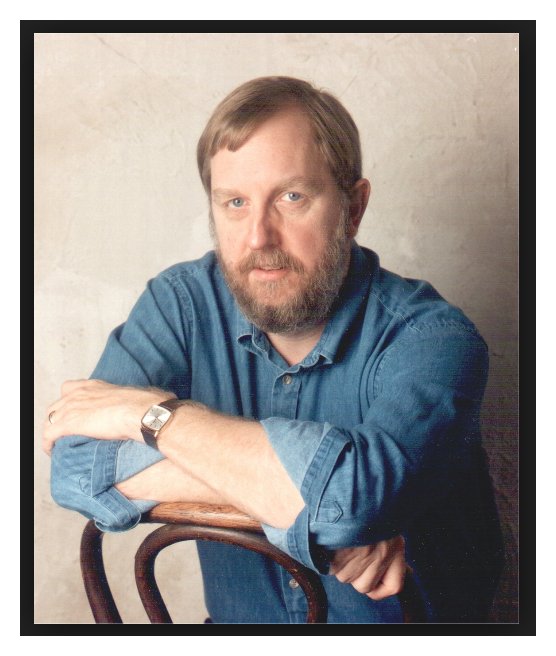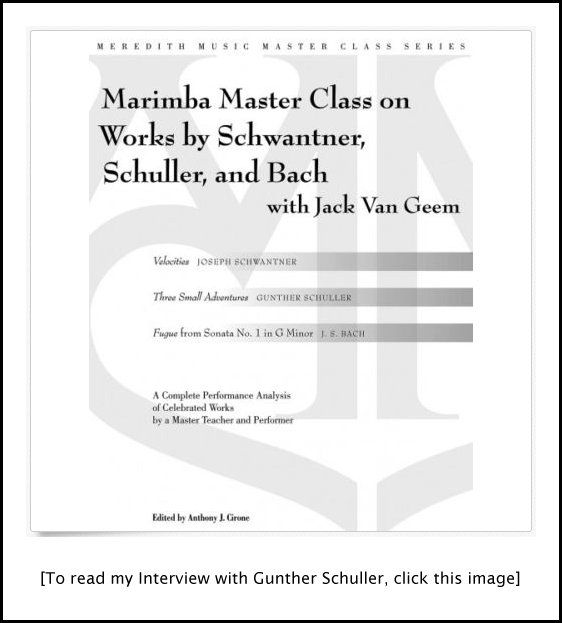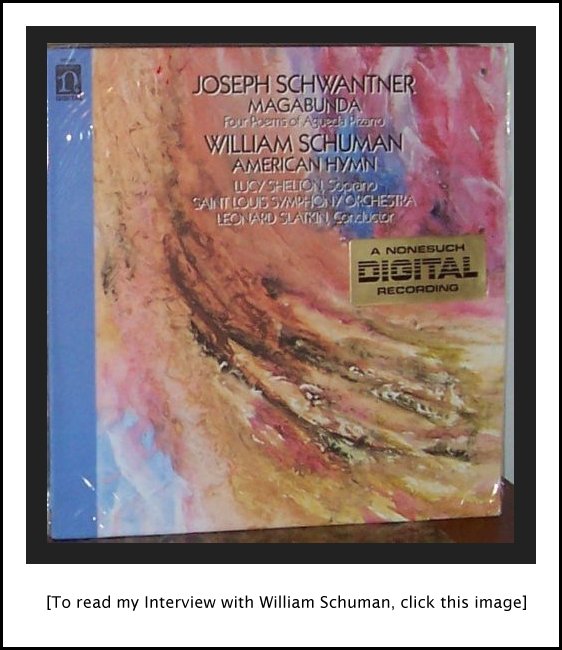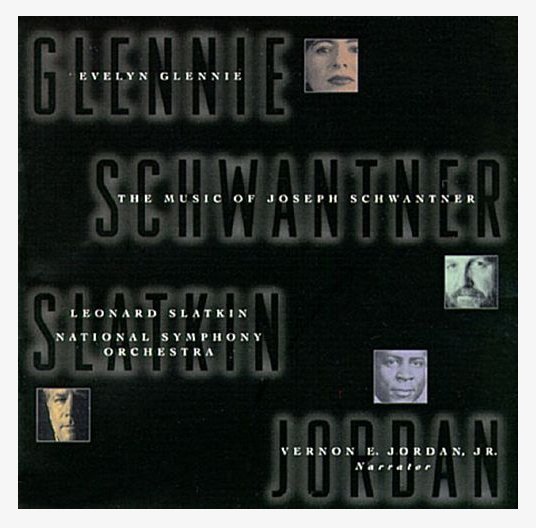

| Born in Chicago in 1943, Joseph
Schwantner received his musical and academic training at the Chicago Conservatory
and Northwestern University. While developing a profile as a leading American
composer, he also served on the faculties of The Juilliard School, Eastman
School of Music and the Yale School of Music, simultaneously establishing
himself as a sought after composition instructor. Schwantner’s compositional career has been marked by numerous distinctions and awards. His early accolades include three BMI Student Composer Awards, the Bearns Prize, a Guggenheim Foundation Fellowship, and many other awards, grants and fellowships. In 1979 his orchestral composition Aftertones of Infinity won the Pulitzer Prize. In 1985 his life and music were the focus of a television documentary entitled Soundings, produced by WGBH in Boston for national broadcast. That same year his work, Magabunda “Four Poems of Agueda Pizarro,” recorded on Nonesuch Records by the St. Louis Symphony, was nominated for a 1985 Grammy Award in the category “Best New Classical Composition,” and his A Sudden Rainbow, also recorded on Nonesuch by the St. Louis Symphony, received a 1987 Grammy nomination for “Best Classical Composition.” Schwantner is a member of the American Academy of Arts and Letters. Schwantner’s Percussion Concerto, among the most often performed of contemporary concert works, was commissioned for the 150th anniversary season of the New York Philharmonic. He has also been commissioned by numerous other leading orchestras and organizations including the National Symphony Orchestra, Boston Symphony Orchestra, Saint Louis Symphony Orchestra, San Diego Symphony, Chamber Music America, Fromm Music Foundation, Naumburg Foundation, Chamber Music Society of Lincoln Center, Los Angeles Chamber Orchestra and the Saint Paul Chamber Orchestra, among many others. Schwantner has enjoyed particular success in the orchestral world. After winning the Pulitzer Prize for Aftertones of Infinity, Schwantner composed New Morning for the World: Daybreak of Freedom on words from Martin Luther King, Jr. for narrator and orchestra, which has since entered the standard repertory of orchestras nationwide. His Percussion Concerto has garnered over one hundred performances since its 1995 premiere and is one of the most performed concert works of the past decade. His music is noted for its deft implementation of luminous color and fluctuating rhythms in a dramatic and unique style, heard in such signature works as the Percussion Concerto, New Morning for the World, and Magabunda, among others. Schwantner’s Morning’s Embrace was commissioned by the National Symphony Orchestra and premiered at the Kennedy Center in Washington, DC on February 23, 2006. The Washington Post praised its “delicate timbres” and “unique and original” sound. His music has been championed by such conductors as Leonard Slatkin, Marin Alsop, Andrew Litton, Hugh Wolff and artists including Evelyn Glennie, Sharon Isbin and Anne Akiko Meyers, among many others. In January 2007, Schwantner was selected as the composer for the second cycle of Ford Made in America, the nation's largest commissioning consortium of orchestras spearheaded by the League of American Orchestras and Meet the Composer. The resulting work, Chasing Light… received its world premiere with the Reno Chamber Orchestra in September of 2008 and completed its tour of over fifty orchestras in all fifty states in the Fall of 2010. The composer's more recent works include: Silver Halo, commissioned by Flute Force for their 25th anniversary season in 2007; and The Poet’s Hour… for violin and string orchestra commissioned by the Seattle Symphony in honor of music director Gerard Schwarz’s farewell season. Other recent commissions for the composer include the world premiere by Eighth Blackbird in October 2006 of Rhiannon’s Blackbirds, which the group commissioned and included on their nine-month United States tour during the 2006-07 season. In August 2009, Schwantner saw the world premiere of Looking Back for flute and piano, commissioned by former students and colleagues of Samuel Baron to commemorate his memory. Looking Back was performed by flutist Alexa Still and pianist Stephen Gosling at the National Flute Association’s 37th Annual Convention in New York City. Schwantner's highly anticipated follow up to his revered Percussion Concerto, Concerto No. 2, received its world premiere with the Indianapolis Symphony Orchestra and Hans Graf as the headline event at the Percussive Arts Society's 50th annual convention. The music of Joseph Schwantner is published by Schott Helicon Music. -- From the Schott-Music website
-- Names which are links in this box and in the interview below, refer to interviews by Bruce Duffie elsewhere on this website |
 JS: Oh, absolutely! This percussion concerto
has been done literally hundreds of times now since its inception in 1995.
JS: Oh, absolutely! This percussion concerto
has been done literally hundreds of times now since its inception in 1995. JS: That’s an interesting question. I
have, throughout my adult life, been in this position of responding to initiatives
by others. People want pieces from me to the point where it seems that
I can operate fairly efficiently that way. If the commission is open-ended,
I will try to steer it in a way that meets my own musical needs. But
I seem to be that kind of musician that I’m able to engage whatever idea is
posed to me. If I find it interesting, then I can usually go with it.
My life, really, is a series of meeting deadlines. [Laughs] It
goes from one piece to the next, essentially, and so far, I’ve been fairly
responsible in being able to meet those deadlines. I’m sure there’ll
be a time when I can’t meet them, and sometimes it’s come very close to not
meeting a deadline.
JS: That’s an interesting question. I
have, throughout my adult life, been in this position of responding to initiatives
by others. People want pieces from me to the point where it seems that
I can operate fairly efficiently that way. If the commission is open-ended,
I will try to steer it in a way that meets my own musical needs. But
I seem to be that kind of musician that I’m able to engage whatever idea is
posed to me. If I find it interesting, then I can usually go with it.
My life, really, is a series of meeting deadlines. [Laughs] It
goes from one piece to the next, essentially, and so far, I’ve been fairly
responsible in being able to meet those deadlines. I’m sure there’ll
be a time when I can’t meet them, and sometimes it’s come very close to not
meeting a deadline. JS: Well, no. Let me say, it depends.
When it comes to a symphony orchestra, obviously with 98 to 103 musicians,
if they all went in their own direction it would be chaos; so, no. But
on the other hand, in this percussion concerto there is a spot toward the
end where there is a simple fermata, a place where the orchestra just stops,
and there’s the most marvelous kind of creative cadenza played by Evelyn
Glennie. She just makes it up. I wouldn’t probably do that if
I wrote a flute concerto, and expected the flutist to have those kinds of
skills. But certainly, I generally rely on percussionists to come up
with something interesting, and that she always does. So to that extent
I’ve given a very substantial piece of the music to the soloist, to let her
bring her own ideas into the piece, and that seems to work out just fine.
JS: Well, no. Let me say, it depends.
When it comes to a symphony orchestra, obviously with 98 to 103 musicians,
if they all went in their own direction it would be chaos; so, no. But
on the other hand, in this percussion concerto there is a spot toward the
end where there is a simple fermata, a place where the orchestra just stops,
and there’s the most marvelous kind of creative cadenza played by Evelyn
Glennie. She just makes it up. I wouldn’t probably do that if
I wrote a flute concerto, and expected the flutist to have those kinds of
skills. But certainly, I generally rely on percussionists to come up
with something interesting, and that she always does. So to that extent
I’ve given a very substantial piece of the music to the soloist, to let her
bring her own ideas into the piece, and that seems to work out just fine.
© 2002 Bruce Duffie
This conversation was recorded in Chicago on March 13, 2002.
Portions were broadcast on WNUR two months later, and again in 2005.
This transcription was made in 2014, and posted on this website at that
time.
To see a full list (with links) of interviews which have been transcribed and posted on this website, click here. To read my thoughts on editing these interviews for print, as well as a few other interesting observations, click here.
Award - winning broadcaster Bruce Duffie was with WNIB, Classical 97 in Chicago from 1975 until its final moment as a classical station in February of 2001. His interviews have also appeared in various magazines and journals since 1980, and he now continues his broadcast series on WNUR-FM, as well as on Contemporary Classical Internet Radio.
You are invited to visit his website for more information about his work, including selected transcripts of other interviews, plus a full list of his guests. He would also like to call your attention to the photos and information about his grandfather, who was a pioneer in the automotive field more than a century ago. You may also send him E-Mail with comments, questions and suggestions.